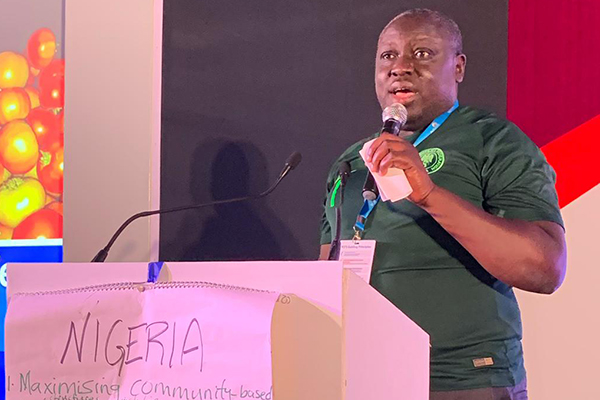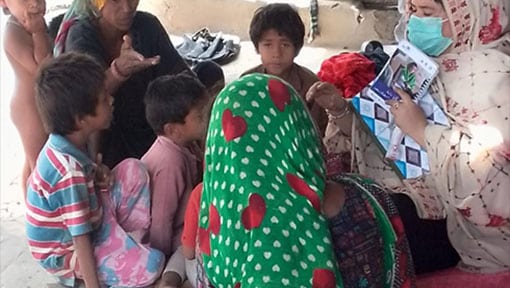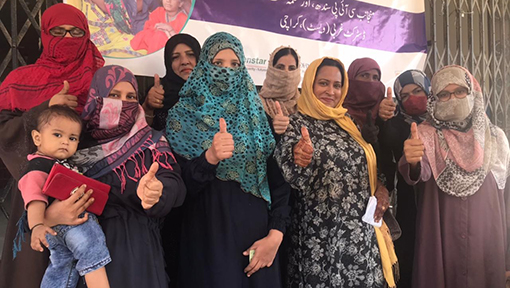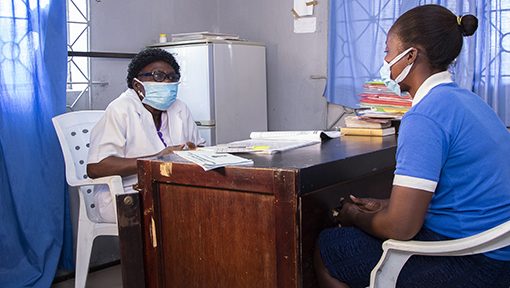Plateau’s Health Leader Discusses Improvements Stemming from 72-Hour Makeovers
Meet one of TCI’s Global Ambassadors, Dr. Miapkwap Livinus, the Executive Secretary of the Primary Healthcare Development Agency of Plateau State in Nigeria. Dr. Livinus was gracious enough to sit down for an interview at TCI’s Annual Meeting in Agra, India, in July 2019. Below is an excerpt from the interview.

Dr. Miapkwap Livinus speaking at TCI’s annual meeting in Agra, India, in July 2019.
Before TCI, what was the situation like in Plateau State?
When TCI were coming to launch the program, they invited my governor from Plateau State to Abuja. So, he was in Abuja for the launch and he immediately called me to find out more about TCI. I looked at the model and realized that it was something quite practical and interesting because the ‘business unusual’ aspect of the model really intrigued me. And, the idea of the whole thing is the flexibility and the fact that the government is driving the process at all times. And, with TCI, I also realized that there is capacity building, which is key. Because when you build capacity of the workers, even if TCI folds up today, the knowledge remains with them – which is something that is very very key. When I came on board, there were some partners on ground doing whatever they wanted to do, but in this case, we are sitting down together to define our parts, based on what we have on ground, with the workplan of the state and the annual operational plan.
What is the situation like now as a result of TCI?
When the 72-hour makeover started, the community was a part of the approach from the beginning with the assessment. We also supported in whatever way we could to ensure that it would be a success. The community normally thinks “what can we get” when they hear an NGO is coming in, but we need to disable their minds. These people [TCI] are bringing in something for the community, not for individuals. Initially, there was this doubt but then they [the community] realized, they were involved in whatever was happening. What really tripped me out more was the transparency involved. The community leaders were the ones going to the market along with my team to source materials and speak with artisans and vendors. There was no hidden agenda, which is quite unique. In fact, that made the other donor-agencies on ground quite uncomfortable.
As a result of a makeover, Plateau State became aware of the lack of water at a health facility. The state then built this water tank with its own funds.
We did makeovers so far in six primary health care centers across two local government areas. It was quite amazing because when I went there, visiting intermittently to do spot checks, they were working until 11pm into the night. The commitment was something. Like, at one of the primary health centers, the community was bringing food to the people who were doing the 72-hour makeover – our staff, TCI staff – because the community saw it as our team, the Plateau community team, not the TCI or State team. For one of the makeovers, the community said that they’d prefer a superior product for roofing that was outside what TCI and the State team budgeted. As a result of the community’s interest, involvement and commitment, they contributed money right then and there to purchase the superior product. This same community have come to my office to personally say thank you! And, I told them: it’s not me, it’s us.
When we did the makeovers, we were able to cut costs because with so little we were able to achieve a lot with the renovation, furniture, etc. In Jos South, the whole facility was painted. Because the community was involved the artisans didn’t charge what they were supposed to charge originally because they saw it as part of their contributions because the community negotiated with their voice, which made it quite cheap. In another two communities, when the deputy governor’s wife and governor’s wife were commissioning the facilities, we learned that they didn’t have water. They were just using a well. During the commissioning, I assured the communities that we were going to dig a borehole for them and I can tell you that as of today there is running water to all rooms of those facilities. We dug a borehole and put a tank in place to pipe the water. I was able to do this with money that the state already had available. We didn’t know that water was an issue before TCI. The TCI model gives us an opportunity to see what some of the problems are. If they don’t complain, we don’t know. We hear more from the community now.
Of these changes, what was most significant to you?
In my opinion, the most significant change is the fact that things are working. And, if you look at the way that the family planning unit has been structured now, it gives room for privacy and confidentially so now there is integration and youth can now access family planning without any stigma.







